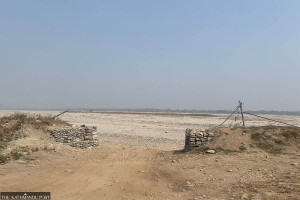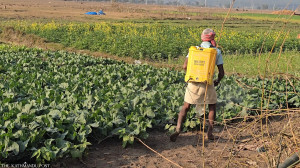Koshi Province
Electric wire traps set up for wild elephants turn into death traps for locals
Although it’s illegal to construct electric fences in the fields, the locals in northern and southern belts have been doing that to ward off wild elephants, according to the Division Forest Office in Jhapa.
Parbat Portel
On July 13, Badri Thapaliya, 60, a resident of Magurmadi in Mechinagar Municipality Ward No. 9, Jhapa, came across a naked wire hanging by the electric wire trap set for wild elephants. Unaware that the wire still had active electricity flowing through it, Thapathaliya grabbed a hold of it and died of electrocution.
The trap was set by Thapaliya himself to ward off wild elephants. But he had forgotten to cut off the power supply to the trap the night before.
Although it’s illegal to construct electric fences in the fields, the residents of northern and southern belts of Jhapa fence their properties with electric wires to ward off wild elephants.
Rohit Dhungana, a resident in Ward No. 9 of Mechinagar, said the villagers are compelled to install electric fences for their safety and to protect their crops from wild animals.
“Wild elephants enter our farmlands almost every day and destroy our crops,” said Dhungana. “We see no other way but to install electric fences to keep the elephants from entering our fields.”
In the last fiscal year, properties worth Rs 3 million were destroyed by wild elephants in Jhapa, according to the Division Forest Office.
In 2019, Thapaliya had lost his older brother, Ganga Thapaliya, to a similar accident; he had fallen into an electric trap set up for elephants.
“He had set up the trap himself but fell into it in a freak accident,” said Tikaram Kandel, a neighbour of the Thapaliya family. “The electric wire traps set up for wild elephants are turning into death traps for people here.”
The same year, two people from Magurmadi also died after being electrocuted in a similar wire trap setting. In Ward No. 4 of Buddhashanti Rural Municipality, two other people lost their lives in a similar accident, according to the District Police Office in Jhapa.
Two similar deaths were reported in 2018 and in 2017, three people had lost their lives after being electrocuted by elephant traps in Jhapa, according to the Office.
Bishnulal Ghimire, chief at the Division Forest Office in Jhapa, said accidents caused by electrocution has become a major problem in the northern and southern belt of the district.
“The prevailing law does not allow anyone to supply electricity to naked wires. But the locals are doing it anyway,” said Ghimire. “When our office sends teams for field inspection, the locals remove the wire trappings but install them right back when the officials leave.”
Every year, the northern and southern belts in Jhapa see frequent movements of native wild elephants as well as wild elephants from India. Bahundangi, Buddhashanti, Khudunabari in Arjundhara and Bhadrapur and Daldiwari villages see herds of wild elephants entering Jhapa from West Bengal in India between the months of June and October. Between 200 and 400 migratory elephants enter Nepal from Jhapa and move all the way to central Tarai every year.
But neither the forest department nor the local authorities have been able to introduce a mechanism to avoid human-wildlife conflict, leading to a number of both human and wildlife casualties over the years. According to the Division Forest Office, 39 people and 11 wild elephants have been killed in incidents of human-wildlife conflict in the last nine years




 10.15°C Kathmandu
10.15°C Kathmandu













